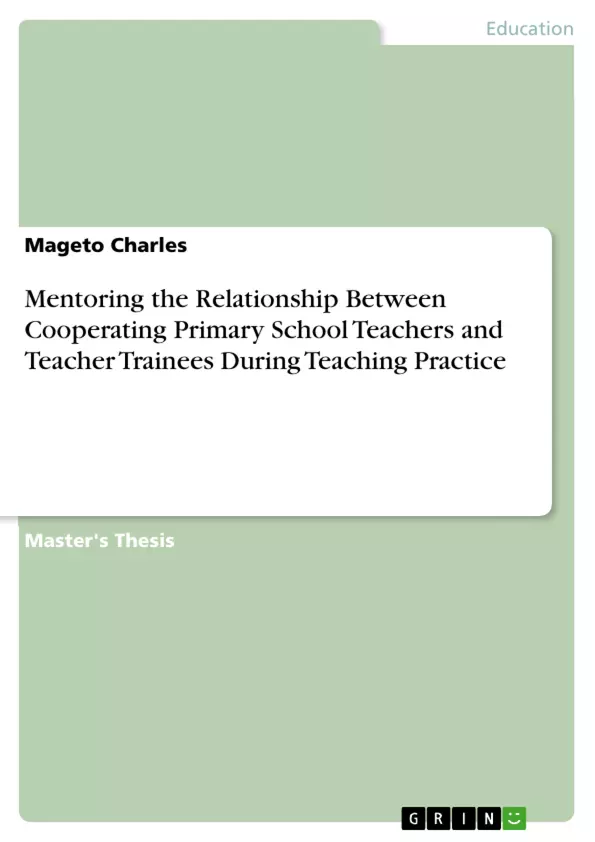Cooperating teachers provide the guidance sought by teacher trainees when they are away from college in the practicing schools and in the absence of the college tutors. This study sought to establish the extent to which this mentorship role is played by analyzing the mentoring relationship between cooperating primary school teachers and teacher trainees during teaching practice.
The objectives of the study were to find out how the cooperating primary school teachers mentored the teacher trainees on: schemes of work and lesson plans; selection and application of instructional methods; lesson presentation and on professional ethics. The theoretical frame work used was based on developmental supervision theory by Glickman (2003). The study adopted a descriptive survey research design. It targeted cooperating teachers from 26 public primary schools from Kakamega and Vihiga Counties in Western Kenya and the student teacher trainees of Eregi and Kaimosi Teachers College who had undertaken teaching practice in the targeted primary schools.
Two cooperating teachers who had handled teacher trainees during teaching practice for at least one year were selected from the schools through simple random sampling. For teacher trainees, focus was on approximately 1000 second year students who had done at least two teaching practice sessions. The teacher trainees were stratified into male and female from which 30% were selected from each gender through simple random sampling method. Questionnaires and interview schedules were used as data collecting instruments.
The data collected was analyzed both quantitatively and qualitatively. Frequency tables were used to present the quantitative data, while qualitatively data was thematically analyzed as per the objectives. The analysis revealed that, majority of the cooperating teachers rarely did assist teacher trainees in preparation of schemes of work and lesson plans, selection and application of instructional methods and lesson presentation.
On professional ethics, it established that, majority of the cooperating teachers often guided teacher trainees in the maintenance of discipline in class. Consequently, the study recommended that, cooperating teachers should check the trainees’ lesson preparation to confirm that, the topics allocated to them are effectively taught; that provision be made for both to regularly discuss the instructional methods before lesson presentation.
Inhaltsverzeichnis (Table of Contents)
- CHAPTER ONE_INTRODUCTION TO THE STUDY.
- 1.0 Introduction.
- 1.1 Background of Study
- 1.4 Objective of the Study.
- 1.5 Research Questions.
- 1.6 Justification of the Study.
- 1.7 Significance of the Study.
- 1.8 Scope of the Study.
- 1.9 Limitations of the Study.
- 1.10 Assumptions of the Study
- 1.11 Theoretical Framework
- 1.12 Conceptual Framework
- 1.13 Operational Definition of Terms
- 1.14 Chapter Summary
- CHAPTER TWO_LITERATURE REVIEW
- 2.0 Introduction
- 2.1 Teacher Education in Kenya.
- 2.2 The Role of Teacher Mentoring in Teacher Education Reform……………….
- 2.3 Schemes of Work and Lesson Plan Preparation...........
- 2.4 Use of Instructional Methods in the Teaching/Learning Process.....
- 2.5 Monitoring and Evaluation of Lesson Presentation..........\li>
- 2.6 Indicators in Monitoring and Evaluation…………………………
- 2.7 Professional Ethics in the Teaching Profession.
Zielsetzung und Themenschwerpunkte (Objectives and Key Themes)
This thesis examines the mentoring relationship between cooperating primary school teachers and teacher trainees during teaching practice in Kenya. The study aims to investigate the extent to which cooperating teachers provide guidance to teacher trainees in areas such as schemes of work, lesson plans, instructional methods, lesson presentation, and professional ethics.
- The role of cooperating teachers in mentoring teacher trainees.
- The effectiveness of mentoring in different areas of teaching practice.
- The challenges and opportunities associated with the mentoring relationship.
- Recommendations for improving the mentoring process in teacher education.
- The impact of mentoring on the development of teacher trainees' skills and knowledge.
Zusammenfassung der Kapitel (Chapter Summaries)
Chapter One introduces the study, providing background information on teacher education in Kenya and highlighting the importance of the mentoring relationship between cooperating teachers and teacher trainees. It outlines the objectives of the study, research questions, justification, significance, scope, limitations, assumptions, theoretical framework, conceptual framework, and operational definitions of key terms.
Chapter Two presents a comprehensive literature review on teacher education in Kenya, exploring the role of teacher mentoring in teacher education reform. It examines different aspects of teaching practice, including schemes of work, lesson plan preparation, use of instructional methods, monitoring and evaluation of lesson presentation, and professional ethics.
Schlüsselwörter (Keywords)
The key keywords and focus topics of this study include teacher mentoring, cooperating teachers, teacher trainees, teaching practice, schemes of work, lesson plans, instructional methods, lesson presentation, professional ethics, teacher education, and Kenya.
Frequently Asked Questions
What is the role of a cooperating teacher?
Cooperating teachers act as mentors for teacher trainees during their practice in schools, providing guidance on lesson planning, instructional methods, and professional ethics.
How effective is mentoring for teacher trainees in Kenya?
Studies show that while mentoring is often provided for discipline and ethics, many cooperating teachers rarely assist in the actual preparation of schemes of work or instructional methods.
What are the key areas of mentorship during teaching practice?
The main areas include schemes of work, lesson plans, selection of instructional methods, lesson presentation, and adherence to professional ethics.
What theory supports teacher mentoring in this study?
The study is based on the developmental supervision theory by Glickman (2003), which focuses on improving teacher performance through structured support.
What can be done to improve mentoring for trainees?
Recommendations include regular discussions between mentors and trainees before lessons and more thorough checks of lesson preparations by the cooperating teachers.
- Citar trabajo
- Mageto Charles (Autor), 2015, Mentoring the Relationship Between Cooperating Primary School Teachers and Teacher Trainees During Teaching Practice, Múnich, GRIN Verlag, https://www.grin.com/document/376901



